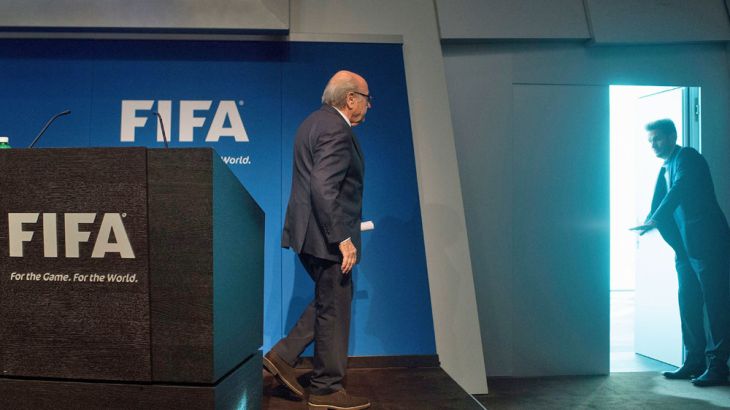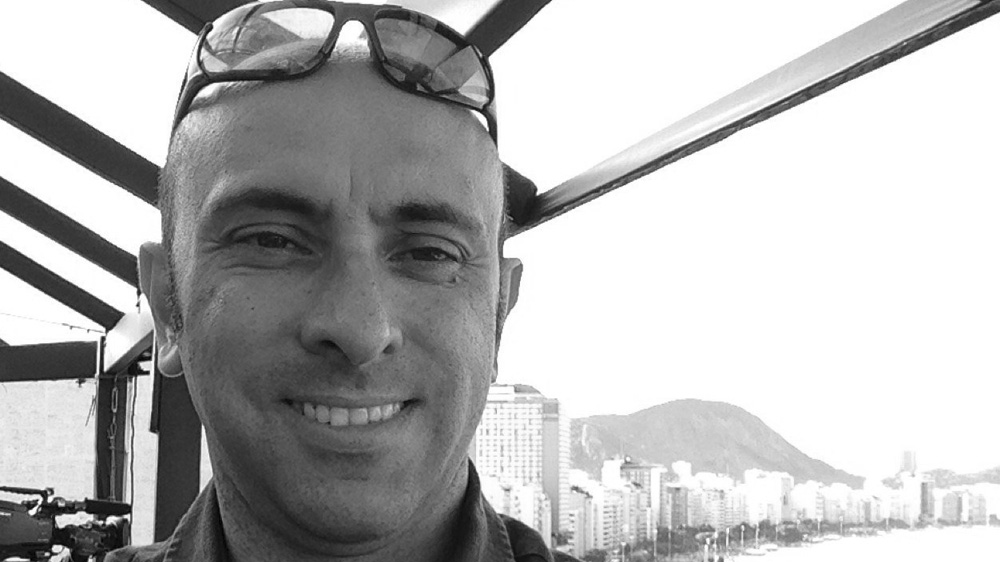Sepp Blatter to resign as FIFA president
FIFA chief says he will step down from football’s governing body once a new president is elected.

FIFA President Sepp Blatter has decided to step down as leader of football’s governing body.
Blatter announced his decision just four days after the FIFA Congress that saw him win a fifth term as the body’s president.
Keep reading
list of 4 itemsMan City know ‘it’s win or Arsenal will be champions’ of the Premier League
Manchester City and Arsenal: breaking down the EPL’s final day title fight
Ronaldo tops Forbes’ list of highest-paid athletes again, Rahm second
“I cherish FIFA more than anything and I want to do only what is best for FIFA and for football,” Blatter said at a press conference in Zurich on Tuesday.
| Blatter’s journey |
|
Blatter has been FIFA president since June 8, 1998.
A business and economics graduate, Blatter also headed the Swiss Ice Hockey Federation and was involved in organising the 1972 and 1976 Olympics.
Blatter joined FIFA as technical director in 1975 and served as general secretary from 1981 until his election as president.
Blatter called allegations against Qatar 2022 racist and called for politicians unhappy with Russia 2018 to “stay at home”.
Allegations of financial mismanagement and sexist remarks for female footballers have landed Blatter in hot water regularly.
|
“FIFA needs a profound overhaul. I have decided to lay down my mandate at an extraordinary elective Congress.
“I will continue to exercise my functions as FIFA president until that election.”
Domenico Scala, head of FIFA’s independent audit and compliance committee, said there would need to be four months’ notice for any new presidential election.
“The decision for the timing of the election of the next president will be up to the executive committee and will take place any time from December until March.”
The unexpected resignation came amid one of the most controversial episodes in FIFA’s history.
Seven high-ranking FIFA officials were arrested ahead of the football governing body’s meeting last Friday.
Swiss authorities had launched a separate criminal investigation into the bidding process for the 2018 and 2022 World Cups that are set to be held in Russia and Qatar.
ANALYSIS: FIFA’s ‘president of everybody’ runs out of friends
At the FIFA meeting in Zurich last Friday, Blatter, 79, had been re-elected when his only rival, Jordan’s Prince Ali bin Al Hussein, withdrew after gaining 73 votes to Blatter’s 133 in the first round of voting.
A day later, Blatter came out fighting, implying that the US timed the announcement of a major corruption probe to try to scupper his re-election bid.
“Arrested for what? Next question,” Blatter dismissed curtly, when asked if he feared where the US federal case was heading following his re-election.
The investigation closed in on Blatter on Tuesday when FIFA was forced to deny that his right-hand man, Secretary-General Jerome Valcke, was implicated in a $10m payment that lies at the heart of the US case.
|
|
Valcke, who has been secretary-general since 2007 and is seen as one of the most powerful men in world sport, had no role in the payments, which were authorised by the chairman of FIFA’s Finance Committee, FIFA said in an earlier statement.
Meanwhile, Switzerland’s office of attorney general (OAG) has confirmed that it was not investigating outgoing Blatter.
The chairman of the committee at the time of the payments was Argentina’s Julio Grondona, who died last year.
Blatter’s “announced resignation will have no influence on the ongoing criminal proceedings”, the attorney general said in a statement.
The attorney general had opened criminal proceedings against persons unknown on suspicion of criminal mismanagement and of money laundering alongside the US corruption investigation.
ANALYSIS FROM OUR CORRESPONDENT
 |
| Al Jazeera’s Lee Wellings |
The end for Sepp Blatter has been coming for some considerable time and I have spent years covering it closely. He became a figurehead for an organisation infamously riddled with corruption and completely discredited, though somehow hung on, claiming he was the man to rectify the situation.
Yet it was still a shock when he announced so suddenly he was standing down. So stubborn has his presidency been, so resilient has he been, so undeniably deft his political nous since he joined FIFA in the 1970s.
This time, with the FBI indictment and the spotlight on his close ally, Secretary-General Jerome Valcke, he was backed right into the corner. More will emerge. There was no hiding place.
His wish of leaving in his own time will surely not be met, and maybe we will see an interim president before the new election in four months.
Four long terms, then one lasting barely four days. A controversial, curious man, not without attributes and ability, but who needed to go. Partly for cosmetic reasons. Whether unfair on him or not, he had become the face of an unacceptable regime. Yes he was loved by many Football Associations benefiting financially … but sadly, hated by football fans across the globe.